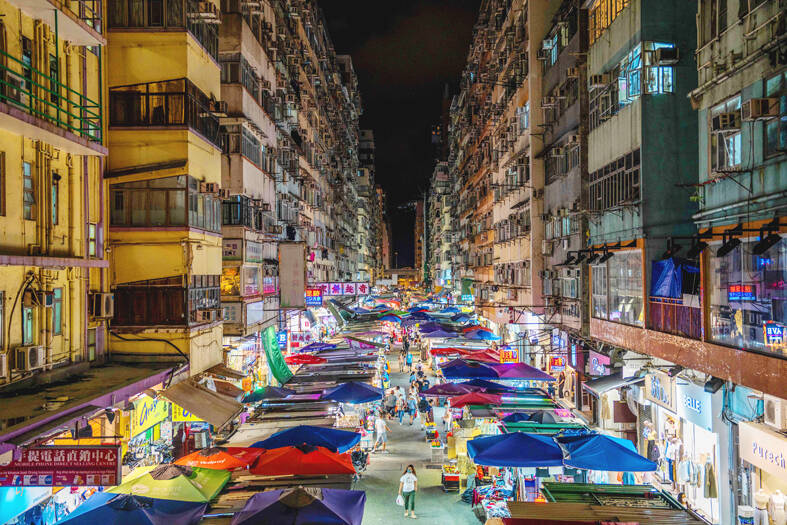Hong Kong is set to end the year in the midst of a full-blown recession, its finance chief said yesterday, as spiraling interest rates join strict COVID-19 controls in hammering the economy.
“There is a very high chance for Hong Kong to record a negative GDP growth for this year,” Hong Kong Financial Secretary Paul Chan (陳茂波) told reporters, adding that interest rates were being raised “at a pace that was never seen in the past three decades.”
Hong Kong’s monetary policy moves with the US Federal Reserve because its currency, one of the cornerstones of its business hub reputation, is pegged to the US dollar.

Photo: AFP
The Fed’s hawkish rate hikes, aimed at curbing soaring inflation, come at an especially difficult time for Hong Kong, dampening sentiment when the economy is struggling.
Hong Kong is currently in a technical recession — recording two consecutive quarters of negative growth this year.
The government has adhered to a version of China’s “zero COVID” policy for more than two-and-a-half years, enforcing strict controls and mandatory quarantine for international arrivals.
Chan signaled his support for making travel and business easier.
“The aspects related to the pandemic need to continue to improve in order for us to see larger investments, because people are more cautious in a high-interest-rates environment,” he said.
Business leaders have long been warning that the COVID-19 controls, combined with Beijing’s ongoing crackdown on dissent, have made it harder to attract talent and cut off Hong Kong internationally, especially as rivals reopen.
Hong Kong has seen a net outflow of more than 200,000 people in the past two years, a record population drop.
“Hong Kong should be ahead of other Asian cities, but now there’s a feeling that we’re falling behind and being left isolated,” Eden Woon (翁以登), the new head of the Hong Kong American Chamber of Commerce told the South China Morning Post in an article published yesterday.
“There are people leaving and the problems of retaining talent — all these things add up together and need to be addressed,” he added.
While the Hong Kong Monetary Authority has no choice but to follow the Fed, major banks such as Standard Chartered PLC and HSBC Holdings PLC had resisted that pressure.
However, HSBC yesterday raised its prime lending rate in Hong Kong by 12.5 basis points to 5.125 percent, the bank’s first rise in four years.
Others are likely to follow suit. That could affect the territory’s once hot property sector, with Goldman Sachs Group Inc estimating that prices could slide by about 20 percent over the next four years.
Hong Kong also experienced a recession in 2019 when months of huge and sometimes violent democracy protests rocked the business district.

The US dollar was trading at NT$29.7 at 10am today on the Taipei Foreign Exchange, as the New Taiwan dollar gained NT$1.364 from the previous close last week. The NT dollar continued to rise today, after surging 3.07 percent on Friday. After opening at NT$30.91, the NT dollar gained more than NT$1 in just 15 minutes, briefly passing the NT$30 mark. Before the US Department of the Treasury's semi-annual currency report came out, expectations that the NT dollar would keep rising were already building. The NT dollar on Friday closed at NT$31.064, up by NT$0.953 — a 3.07 percent single-day gain. Today,

‘SHORT TERM’: The local currency would likely remain strong in the near term, driven by anticipated US trade pressure, capital inflows and expectations of a US Fed rate cut The US dollar is expected to fall below NT$30 in the near term, as traders anticipate increased pressure from Washington for Taiwan to allow the New Taiwan dollar to appreciate, Cathay United Bank (國泰世華銀行) chief economist Lin Chi-chao (林啟超) said. Following a sharp drop in the greenback against the NT dollar on Friday, Lin told the Central News Agency that the local currency is likely to remain strong in the short term, driven in part by market psychology surrounding anticipated US policy pressure. On Friday, the US dollar fell NT$0.953, or 3.07 percent, closing at NT$31.064 — its lowest level since Jan.

The New Taiwan dollar and Taiwanese stocks surged on signs that trade tensions between the world’s top two economies might start easing and as US tech earnings boosted the outlook of the nation’s semiconductor exports. The NT dollar strengthened as much as 3.8 percent versus the US dollar to 30.815, the biggest intraday gain since January 2011, closing at NT$31.064. The benchmark TAIEX jumped 2.73 percent to outperform the region’s equity gauges. Outlook for global trade improved after China said it is assessing possible trade talks with the US, providing a boost for the nation’s currency and shares. As the NT dollar

The Financial Supervisory Commission (FSC) yesterday met with some of the nation’s largest insurance companies as a skyrocketing New Taiwan dollar piles pressure on their hundreds of billions of dollars in US bond investments. The commission has asked some life insurance firms, among the biggest Asian holders of US debt, to discuss how the rapidly strengthening NT dollar has impacted their operations, people familiar with the matter said. The meeting took place as the NT dollar jumped as much as 5 percent yesterday, its biggest intraday gain in more than three decades. The local currency surged as exporters rushed to